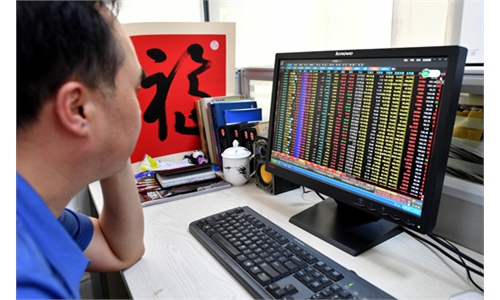Post-90s generation in China becomes a major force in capital market
Post-90s generation becomes a major force in capital market

Photo: IC
From "large gains" to "heavy losses," a good number of young Chinese investors who are jumping on the bandwagon of public equity fund investment have experienced a roller-coaster of a ride over the past few months.
Since last year, public equity fund investment became sought after and widely known due to major stock price gains, while following the Chinese Spring Festival falling in mid-February this year, it was frequently seen on the trending list of China's social media platform Weibo due to consecutive steep declines.
But the losses have not stopped the pace of those who are still longing for "wealth freedom" and "getting rich overnight" through stock investment. While exchanging investment experiences, complaining about losses, and chasing after star fund managers like superstars, "fund" has no doubt become the hottest buzzword among many youngsters in China today.
Statistics show that as of December 31 last year, the number of equity funds that doubled their earnings last year reached 89, a record high since 2007. Behind this "fund craze" is the influx of young investors born in the 90s and even the 00s into this capital market.
According to the China Household Wealth Index Report, jointly released by Southwestern University of Finance and Economics and Alipay last year, the post-90s generation accounted for more than half of new investors in the equity fund market in 2020.
Some analysts believe that young investors' participation is due to the soaring performance of public offering funds last year, and to a large extent, it is also due to the fact that investors are becoming younger in the country.
Previous data from the China New Economic Research Institute showed that the post-90s generation is considering financial management 10 years earlier than their parents. Many people start financial management within two years of work.
"Compared with bank deposits and other traditional financial management methods, funds have relatively better yields and do not require frequent action like the stock market, and you can see tangible returns in the short term," Zhang Wan, a Beijing-based white-collar worker, told the Global Times on Sunday.
Rising volatility
Zhang has bought more than five public equity funds since last year, covering all major sectors in the stock market, such as shares of new energy vehicles, pharmaceuticals and Chinese liquor. He has also bought qualified domestic institutional investor (QDII) products, which are primarily invested in equities listed on the Hong Kong stock market.
Due to volatility in the capital market, many investors' earnings before the holiday evaporated sharply, and some even suffered staggering losses. The plummet has also given some young investors a painful lesson of investment.
"I will redeem some of my funds given the recent slump of the market, but overall, I don't worry much about the short-term losses, I will bet on future gains," said Zhang.
There are now more than 7,000 kinds of public equity fund on the market, and the difficulty of choosing a fund is no less than choosing a stock, Xu Maoyang, an analyst from the Sinolink Securities, told the Global Times.
Compared with the previous generation of stockholders and fund investors, young investors have a better understanding and acceptance of new things than older demographic groups, but most young people choose funds based on "blind selection," Xu said, calling for wise investment ideas rather than chasing after ups and downs through frequent purchases and sell-offs.
As of the end of 2020, the number of China's public fund management institutions stood at 146, operating 7,913 public equity funds, with a total management scale of 19.89 trillion yuan, data from the AMAC showed.
A global rush
Despite the large-scale "rush to the market," judging from the current resident allocation structure, the proportion of Chinese residents' financial asset allocation is far lower than their peers in developed countries, according to the 2020 China Public Funds Annual Report recently released by Hengtian Fund.
Overseas youngsters also have an exposure to financial management ideas at an early age.
For instance, a Global Times reporter surveyed 10 children around the age of 14 in the US; seven of them were willing to make money online, and three of them have already made some money online from time to time.
Generation Z will not waste money, media reports said, citing a recent survey conducted by the German Le Monde newspaper. Respondents of the survey can spend an average of 482 euros per month, of which 141 euros are used for equity investments.
As for how to manage money, 29 percent put money in their bank's saving accounts, 17 percent invest in real estate, 12 percent invest directly in stocks or funds, 5 percent invest in pension funds, and 4 percent buy insurance policies.
The pandemic has also promoted the global young investors' participation in the capital market.
According to the observations of a reporter from the Global Times in Japan, after the pandemic outbreak, under the impact of low economic growth, Generation Z young people in Japan born after 1995 have a tendency to convert passive savings into active investment portfolios.
Since 2021, more than 40 percent of those who set up new security accounts are Generation Z.
The growth rate of the number of newly opened accounts in this age group is the highest among all age groups. In 2020, from the end of March to the end of June, the growth rate reached 19.2 percent, data from Nomura Securities showed.

